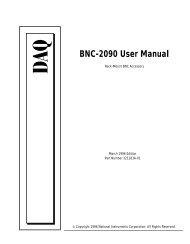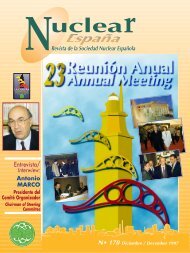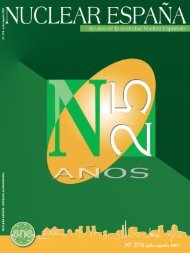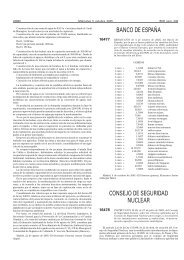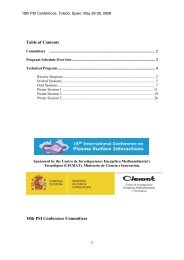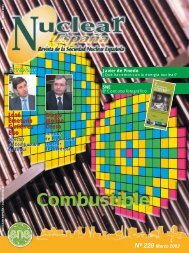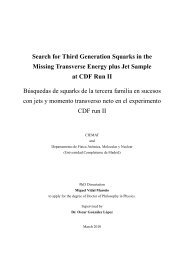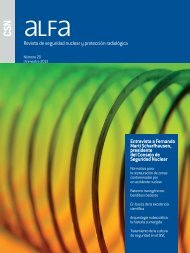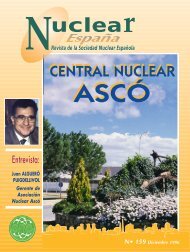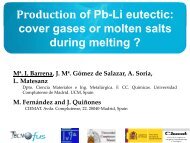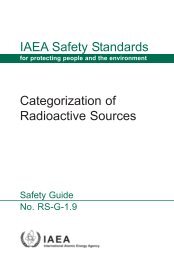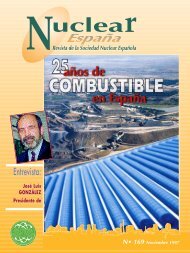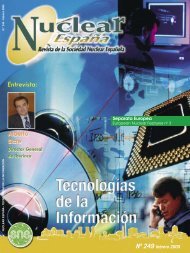EntrEntr evista/evista/ InterInter viewview
EntrEntr evista/evista/ InterInter viewview
EntrEntr evista/evista/ InterInter viewview
Create successful ePaper yourself
Turn your PDF publications into a flip-book with our unique Google optimized e-Paper software.
CENTRALES NUCLEARES/NUCLEAR POWER PLANTS<br />
buena formación y la experiencia<br />
de operación de los operadores han<br />
permitido que las centrales recuperen<br />
la potencia de funcionamiento<br />
en cortos periodos de tiempo tras<br />
las paradas.<br />
No se han finalizado aún los estudios<br />
sobre costes de operación y<br />
mantenimiento para el año 98, pero<br />
se anticipan resultados que continúan<br />
la tendencia descendiente del<br />
período 1993-1997 a los que me referí<br />
el pasado año en esta misma<br />
Jornada. Recordándoles aquellas cifras,<br />
en 1997 se situaron en 1,26<br />
Ptas/kWh neto (aproximadamente<br />
0,84 centavos de dólar), en línea<br />
con la de las centrales más eficientes<br />
del mundo.<br />
Por completar y actualizar los datos<br />
habituales les indicaré que la<br />
potencia total instalada del parque<br />
electro-nuclear a 31 de Diciembre<br />
de 1999 ascendió a 7.749,1 MW,<br />
incrementando en 111 MW la del<br />
año anterior, como he señalado anteriormente,<br />
y representando el<br />
16,7% de la potencia total instalada<br />
por las empresas eléctricas miembros<br />
de UNESA.<br />
Me agrada poder reiterar un año<br />
más, que las nueve unidades que integran<br />
el parque nuclear español<br />
continúan con un excelente comportamiento<br />
en cuanto a seguridad,<br />
disponibilidad y costes, manteniendo<br />
la línea de los años pasados y<br />
poniendo de manifiesto el alto nivel<br />
de cualificación de los profesionales<br />
que lo hacen posible. Este comportamiento<br />
fiable, seguro y económico<br />
de las centrales nucleares constituye<br />
el mejor argumento para poder continuar<br />
contando en el futuro con la<br />
energía nuclear como fuente de suministro<br />
eléctrico de nuestro país,<br />
durante todo el tiempo que lo permita<br />
la vida útil de cada una de<br />
ellas.<br />
No puedo olvidar mencionar la<br />
renovación de los Permisos de<br />
Explotación recibidos durante este<br />
año por las centrales de José<br />
Cabrera, Garoña y Trillo, para las<br />
que el positivo dictamen del CSN,<br />
máxima autoridad nacional en seguridad<br />
nuclear y protección radiológica,<br />
no hace sino avalar la afirmación<br />
que antes realicé sobre la<br />
seguridad del funcionamiento del<br />
parque nuclear español.<br />
LAS ACTIVIDADES DE UNESA<br />
EN MATERIA NUCLEAR<br />
Permítanme ahora dedicar unas<br />
palabras a las actividades sectoriales<br />
que se desarrollan en UNESA en<br />
materia nuclear.<br />
Como muchos de ustedes saben,<br />
en 1999 UNESA ha culminado un<br />
proceso de reestructuración interna<br />
e institucional, como consecuencia<br />
de su adecuación a las nuevas exigencias<br />
del entorno competitivo y<br />
liberalizador contenidas en la Ley<br />
54/97 del Sector Eléctrico. Esto ha<br />
traído consigo cambios en su actividad<br />
profesional y en su personalidad<br />
jurídica.<br />
En este sentido UNESA, creada en<br />
1944 como Sociedad Anónima, ha<br />
pasado a constituirse como la<br />
Asociación Española de la Industria<br />
Eléctrica, organización profesional<br />
de carácter sectorial y empresarial<br />
para la coordinación, representación,<br />
gestión, fomento y defensa de<br />
los intereses empresariales y profesionales<br />
de sus miembros, dotada<br />
de personalidad jurídica y plena capacidad<br />
de actuación. Como organización<br />
sectorial, a partir de ahora<br />
se podrán adherir a la Asociación<br />
todas aquellas entidades que estén<br />
autorizadas a realizar en nuestro país<br />
actividades de generación, transporte,<br />
distribución o comercialización<br />
de energía eléctrica.<br />
En lo que se refiere a las actividades<br />
nucleares, enmarcadas en el<br />
Comité de Energía Nuclear de UNE-<br />
SA, los cambios introducidos se han<br />
basado en un análisis cuidadoso del<br />
conjunto de actividades que pueden<br />
seguir desarrollándose desde un foro<br />
de Unidad Sectorial en beneficio<br />
de todas y cada una de ellas, así como<br />
de sus empresas propietarias, las<br />
cuales se ven sometidas a exigencias<br />
cada vez mayores en los ámbitos<br />
de:<br />
• la seguridad nuclear<br />
• a competitividad del mercado<br />
• a eficiencia interna<br />
• el medio ambiente<br />
Desde UNESA se han coordinado<br />
actividades relativas a la seguridad y<br />
fiabilidad de las centrales nucleares,<br />
así como otras que ofrecen economías<br />
de escala al conjunto de las<br />
mismas y que, al ser de contenido<br />
institucional, no menoscaban los<br />
principios de soberanía empresarial<br />
y de competitividad que inspira la<br />
actual reforma del sistema eléctrico.<br />
Entre ellas se encuentran: (1) la definición<br />
de posturas comunes en materia<br />
nuclear de las Empresas<br />
Eléctricas y Centrales Nucleares ante<br />
los organismos de la Administración<br />
competentes, (2) la recopilación<br />
y transmisión de las<br />
authority for nuclear safety and radiological<br />
protection, issued its positive report, this endorsing<br />
what was said before regarding the safety and<br />
performance of Spain’s nuclear power plants.<br />
UNESA ACTIVITIES IN RELATION TO<br />
NUCLEAR MATTERS<br />
Please allow me to say a few words about the<br />
activities carried out by UNESA in relation to nuclear<br />
matters.<br />
As many of you know, during 1999 UNESA has<br />
culminated a process of internal and institutional<br />
restructuring in order to adapt to the new<br />
requirements of the competitive, liberalised<br />
environment, contained in the Electricity Industry<br />
Act, Law 54/97. This has brought changes in the<br />
organisation’s professional activity and in its legal<br />
standing.<br />
In this respect, UNESA, created in 1944 as a<br />
Limited Company, has now become the Spanish<br />
Electricity Industry Association, a professional,<br />
sector-specific business organisation for the<br />
coordination, representation, management,<br />
promotion and defence of the business and<br />
professional interests of its members, and having its<br />
own legal standing and full power to act. In view of<br />
its being an organisation set up for the industry, as<br />
from now all those bodies authorised to carry out<br />
electricity generation, transmission, distribution or<br />
commercialisation activities in this country may join<br />
the Association.<br />
As regards nuclear activities, encompassed within<br />
the framework of the UNESA Nuclear Energy<br />
Committee, the changes made have been based on<br />
in-depth analysis of the set of activities that might<br />
continue to be developed by a sector-specific forum,<br />
for the benefit of the plants and their owner<br />
companies, which are required to face increasingly<br />
strict demands in the following areas:<br />
• nuclear safety<br />
• the competitiveness of the market<br />
• internal efficiency<br />
• the environment<br />
Activities have been coordinated from UNESA in<br />
relation to the safety and reliability of the nuclear<br />
power plants, along with others offering economies<br />
of scale to the plants. In view of their institutional<br />
nature, these activities have not undermined the<br />
principles of business sovereignty and<br />
competitiveness inspiring the current reform of the<br />
electricity system. Among these activities are: (1) the<br />
definition of common positions in relation to nuclear<br />
issues by the Electricity Utilities and Nuclear Power<br />
Plants, in their dealings with the competent bodies of<br />
the Administration, (2) the compilation and<br />
transmission of operating experiences between the<br />
Spanish nuclear plants, and between these plants<br />
and those of the rest of the world, especially with<br />
regard to nuclear safety and operating reliability, and<br />
(3) representation of the Spanish Nuclear Power<br />
Plants in international forums and organisations.<br />
In this respect, UNESA has maintained permanent<br />
relationships with the Spanish authorities competent<br />
for nuclear issues, mainly the Nuclear Safety Council<br />
and the Directorate General for Energy – General<br />
Sub-Directorate for Nuclear Energy. At international<br />
level, UNESA has participated intensely in the<br />
activities of the most relevant nuclear bodies, both<br />
governmental (IAEA, NEA/OECD, General<br />
Directorates of the European Commission, etc.) and<br />
non-governmental (WANO, INPO, EPRI, NEI,<br />
EURELECTRIC, etc.).<br />
The organisation of the UNESA Nuclear Energy<br />
Committee is based on three Commissions that<br />
encompass the three Joint CSN-UNESA Working<br />
Groups and the ENRESA-UNESA Parity Commission.<br />
A b r i l 2 0 0 0<br />
R e v i s t a S N E




